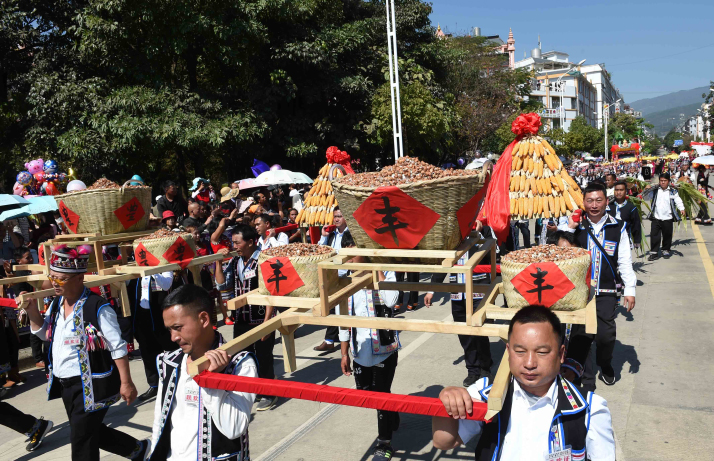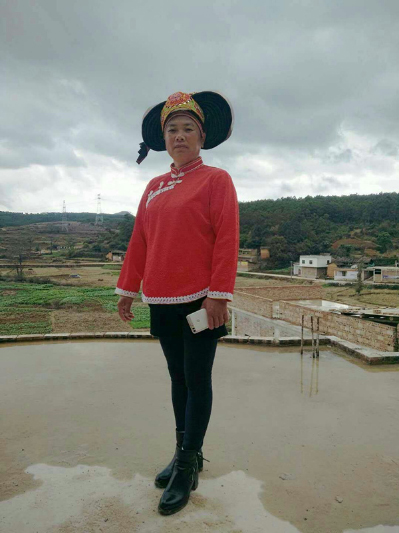| Lifestyle |
| Tastes of the Spring Festival | |
| Rituals have become imprinted on people's minds and help connect generations | |
|
|
 Ethnic groups display produce from the harvest during a parade to celebrate the Spring Festival at Lancang Lahu Autonomous County in Pu'er City, Yunnan Province on February 7 (XINHUA)
When the first sun rose over Tuozhi Bai Village in southwest China's Yunnan Province on the morning of the first day in the Lunar calendar, the candles in central room of Li Zhongwu's family were lit. Surrounding the candles were memorials to remember the family's ancestors. Li, dressed smartly, then burn incense to show his respect. The village where Li lives is also the home of various ethnic groups. They all follow their own unique customs to celebrate the New Year which have developed through family foods, traditions and cultural practices. After graduating from college, Li went back to work in his hometown, where worshiping ancestors and preparing a vegan banquet are two traditional activities to celebrate the Lunar New Year. Today, only few families, including the Li's, have preserved both of these customs. "My grandmother is Buddhist and imposed a lasting influence on me; hence a vegan banquet will be served on the first day of the Spring Festival." Before starting cooking, all the crockery and tableware should be washed in a pond. According to his parents, this was the cleanest water source. "The washing always evokes memories of my childhood." Five different dishes are served on the table, which is the traditional number of different food eaten at the Chinese New Year in his family. "You might think that making a vegan feast is easy but it isn't." Li usually takes a prominent role in the ceremony, despite being one of the younger members of the family with youths normally taking a passive role in such rituals. During this year's festival, the family planed a special vigil for Li's deceased great grandfather. "For me, the Spring Fstival is all about preserving a close family bond." In Zhang Pan's yard, preserved pork was hung which gives off an inviting miasma. Zhang and his wife, both born in the 1990s in the village where their parents and daughter still live, have been working in east China's Zhejiang Province. Thus, the Spring Festival is an important time for the family to reunite. Each Spring Festival, Zhang's parents always insisted on making preserved pork, regardless of the hard work it took to prepare it. "It is difficult to make because the procedures are so complicated, the storage of preserved meats is also difficult as modern houses are not well ventilated," he said, "Many residents do not make preserved meats at home nowadays." In addition, before preserved meat is not fully dried, a faint attracts many flies so the father has to keep them away with a self-made tool, he explained. After the holiday, Zhang would pack the best of the preserved pork and take it home in Zhejiang. He said, "For me, preserved pork is the taste of the Spring Festival."  Zhu in the traditional costume of the Zhuang ethnic group (COURTESY PHOTO)
Zhu, a Zhuang native woman, has been living in her village for 25 years since she married a local Han Chinese man. Unlike many other Zhuang women who relinquish their traditional culture when marrying outside of their ethnic group, Zhu has brought her culture to her husband's family. During the Spring Festival, Zhuang people dine on rice dumplings wrapped in leaves. They also wear traditional costumes to greet the coming Lunar New Year. With her traditional costume, Zhu was regarded as one of the most beautiful women in her village. "My outfit for the Lunar New Year was designed two years ago. I've got four new outfits for the Spring Festival since I got married." Her appreciation for color changed with age, now, she preferred more subtle colors such as brown and black rather than bright red. "I learned how to cook from my mother and each Spring Festival I make these foods myself, except the year that I got injured in a car accident." On the eve of the Lunar New Year, Zhu cooks rice dumplings while staying up late to welcome in the New Year. She also gave the food to relatives and friends as gifts. Zhu's has maintained memories of her youth and also respected her husband's Han culture. "Everywhere I go can be my hometown as long as I keep the traditional culture of my ethnic group." Although it is often said that traditions have diminished in recent times but numerous people still insist on practising customs. These rituals have become imprinted on people's minds and help connect generations and people from different ethnic groups in China. Copyedited by Craig Crowther Comments to liqing@bjreview.com |
|
||||||||||||||||||||||||||||||
|